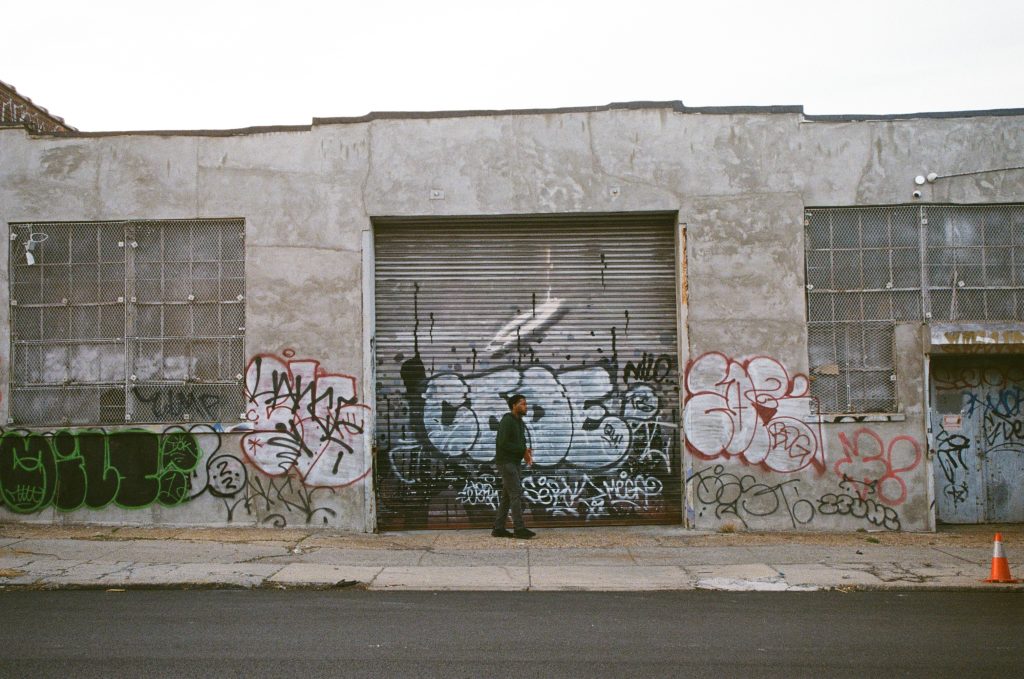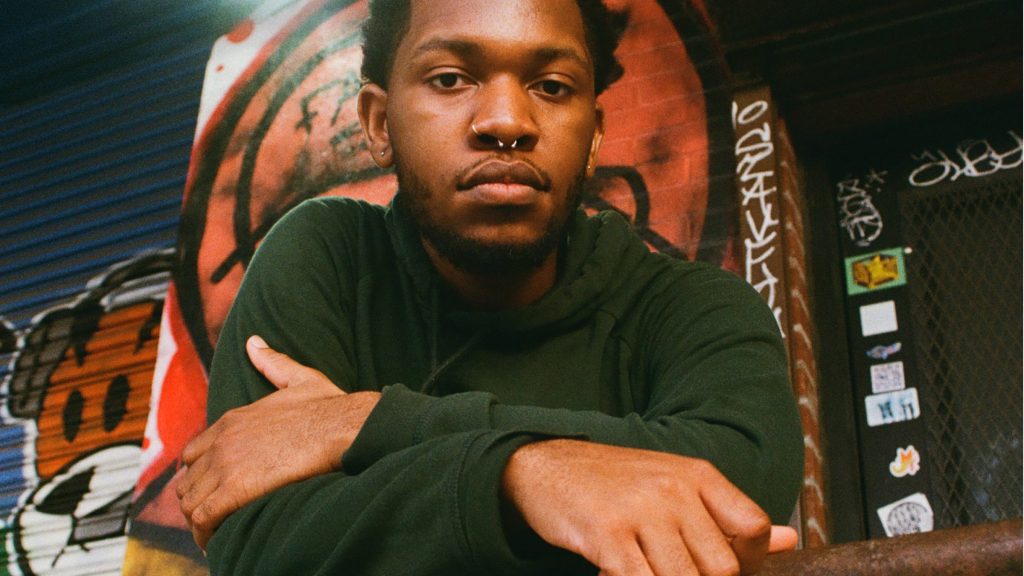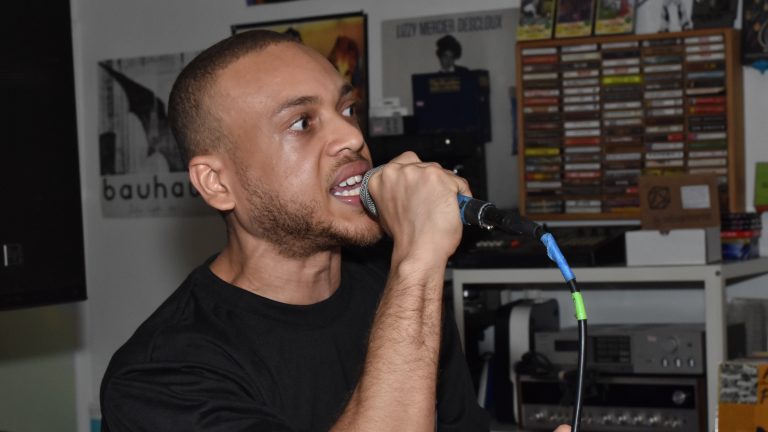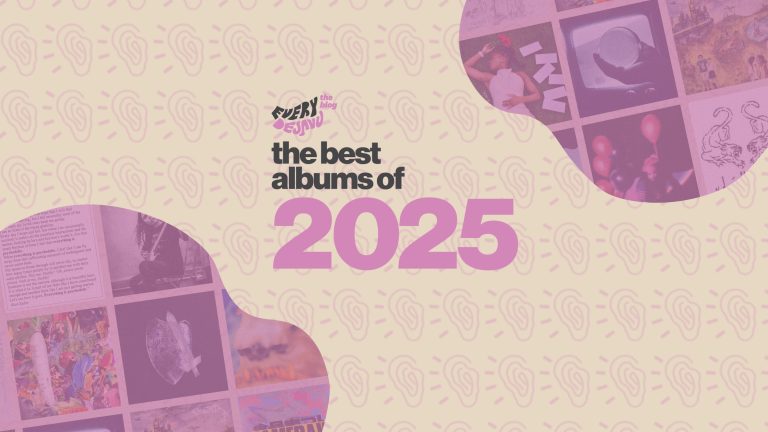“My shame in sheep’s clothes” repeats in my head as a thunderous loop like it does through shemar’s track “foxhole,” off their new album emerge “n” see. It’s a confessional roared and echoed over haunting production and dizzying static. It’s witty but powerful, sparking reflection on wearing shame. How do I wear mine? How do others dress theirs up? And what happens when our hidden wounds spill into the lives of the people around us?
Across emerge “n” see, there’s emotional clarity but none that seems without hard work with each song digging into different parts of shemar’s life and the world that surrounds them. The album, a hip-hop project defined by abrasive and raw soundscapes, has songs that feel like scratchpads of reflection. “gargoyles” tackles the subject of unhoused people and the way society interacts with them, especially with shemar’s own perspective in New York City. “fightinggg” taps Jay Cinema for a song about the exhausting work of competing with privilege. “what i learned in boating school…” is a poetic display of deconstructing the troubles and tension of a crumbling relationship. shemar’s roaring, commanding vocals bring passion and depth to introspective lyricism about self-discovery, masculinity, and trauma.
The exploratory project follows the Child Actor-produced EP, sunscreen, one of my favorite projects of 2024 due to shemar’s vulnerable writing paired with fluid, soul-tinged, and intricately layered beats. Where sunscreen offered a focused emotional palette, emerge “n” see is a definitive display of shemar’s singular voice, shaped not only by their striking vocal delivery, personal and poetic expression, but a distinct sound sensibility balancing harsh textures with full-bodied ethereality.
emerge “n” see’s production veers between blown-out distortion tinged with a balancing act of airiness such as on the opening track, “s.o.a.r., c.r.e.s.t.,” and maximized warmth like on “albany ave.” Its influence of jazz, post-punk, and noise is apparent and at-times overwhelming, but it is hip-hop through and through: sample-based, bar-heavy, and rooted in self-expression—even as it pulls everything apart. This expansive palette is made up of six producers: Outside House, kiluhmanjaro, bloomcycle (the producer moniker for Big Flowers), MILLENIUM, Sasco, and shemar themself. Certain signature moments best describe the cohesive thread of all these producers that make up emerge “n” see: beautiful keys of “hypertension,” droning noises and distorted glitches of “mo’ better blues,” ghostly distant opera-esque vocal samples of “destroy build destroy.” At times, one song may feel detached in experience from another, but they’re all threaded together by shemar, who has full control of what an album by them feels and sounds like.
Following the album’s release, shemar spoke with EveryDejaVu to discuss the philosophies behind their writing, the importance of community, and how emerge “n” see came to be.
You seem out and about, whether attending or performing at a show or music-related in-person events. What do you feel is the importance of in-person communities? And online communities?
There are two levels to it. There’s the interesting rap level, which is inspirational. It feeds my mind—even beyond just a rap show. Big Flowers, for example, will do collage things and I’m not super into visual art, I can’t do none of that shit, but it’s inspiring talking to them about it. Some of my friends are more into poetry in a spoken word sense [compared] to written poems. If I hear about something, I’m going to pop out because I could get a line from this, or an idea from this, or make a new friend, just have interesting conversations. Then, this is good for my mental health; being cooped up at home, at school, at work, doing the same thing. My life without the context of rap is super monotonous, which can be detrimental to my well-being. I just need to be outside doing other things—experiencing the world. I’m in New York City, you know?
When it comes to online, it can be the same thing. There are friends I have that are online friends in the sense we met mainly through rap and then we became genuine friends. But there are online friends and friends who I happened to meet online. With the platforms we commonly use, mainly thinking about Twitter, I have to put a degree of separation for my own mental health. There’s wholesome stuff there, but it’s also a cesspool. Growing up, I’ve always had a real personal relationship with the internet. I’m an internet baby, but now that I’m older, I can’t live the way I used to like when I was a kid.
What are the differences you’ve noticed? Is it in the way you consume the internet or just the things you see?
Both—especially the things you see. You’re just exposed to so much more because the algorithm is like, shemar likes this, this, and this. But there’s also a lot of I want shemar to like this. Like I’m researching the Black Panthers and I get some weird homophobic hotep shit because they mentioned Huey P Newton one time, but it’s like, no, I’m not with that. I’m over here. I’m not over there.
It’s a scary reality especially as some people aren’t aware of it and become consumed. The positive side of social media is discovering music and learning new things. Have you recently made any cool discoveries?
Outside House [producer of most of emerge “n” see]. We started talking on Twitter through Hester Valentine. Or the beat on the album from MILLENIUM. MILLENIUM dead just hit me on Twitter and was like, ‘I made this beat, can I send you this beat?’ and I was like, this is the best beat ever. Also related to MILLENIUM, ÅGHETTOPHĮLOSØPHER. He just put out an EP with MILLENIUM [Red, White, & Blue Has No Symphony]. ÅGHETTOPHĮLOSØPHER is the best rapper, no funny shit. He’s the best rapper, he’s so sick—so inspiring. Another one—this wasn’t a social media platform—but Camille put out an EP with kiluhmanjaro. I found out about Camille last year through SoundCloud. She followed me on SoundCloud and whenever someone follows me on SoundCloud, I’ll check their page. I was like, yo, this n— is sick. Then we became cool. That’s how she gets on [projects with] kiluhmanjaro, Money For Water, and so on. If I took a minute to look at my Apple Music or Bandcamp, I’m sure I’d find something else I wouldn’t have discovered if not for social media, but I can’t think of anything off top besides the friends I’ve made and they’re amazing.
You mentioned you’re an internet baby. Do you remember the first time it clicked for you that you could find new music online?
Oh man, this is an embarrassing answer. I’m hella into Super Smash Bros. and was in middle school when Smash 4 came out. There’s these combo videos. I was kind of [already] into rap because of my pop, but I wasn’t actively discovering music. But I’m watching the combo videos and I’m like, man, these songs are good as fuck—who is this dude? I go on DatPiff and figure it out. It’s Logic and I’m eating this shit up, bro. I was the biggest Logic fan. Then I got into Childish Gambino through my dad, but I have a weird relationship with Donald Glover. My dad put me on to Camp and Because the Internet, but I found Cul-de-sac, the Royalty mixtape. In high school, my best friend at the start of high school, she put me on to Odd Future and she loved Chance the Rapper. That’s how I found Acid Rap and then Coloring Book. I had to go and find 10 Day and this isn’t even deep digging or anything, but that was the start. This is 2017 when DAMN. came out. Then my dad finally got Spotify for all of us, the family plan. So I’m listening to DAMN. and I’m going to the related artists. I’m like who’s Joey Bada$$? Who’s Frank Ocean? And it’s like oh, this is the tornado song.
I’m not letting you get away with not telling me who your Smash main is.
I’m very much a character crisis ass dude. I ended Smash 4 maining Mewtwo when Mewtwo got hella buffed. But in Ultimate, I’m a reluctant Donkey Kong main. Fox is the character my brain wants to play and enjoy and I figured it out, but Donkey Kong is like my instincts.
Talk to me about sunscreen. Can you tell me how that started and how you and Child Actor came to work together?
I mentioned Big Flowers before; shout out Big Flowers. I was at my internship, I worked at a high school and would play the kids beat tapes. I was playing the Ajai II tape and at this point, Child Actor is my favorite producer. He’s a fucking legend; I love Child Actor. I go to my Close Friends story on Instagram like, ‘bro I would die for a Child Actor beat.’ Two days later, Big Flowers texted me, ‘Happy birthday’ and it was a beat. ‘This is from Child Actor.’ And I’m like what the fuck. I wrote “affirmation ii” to it, and he was like, ‘Sick, maybe we could do an EP because I have so much shit I’m working on.’ This was before the Previous Industries stuff came out, the other miscellaneous songs with Armand Hammer hadn’t come out yet. Eventually Child Actor sent the sunscreen pack over and we made sunscreen. I feel sunscreen set the blueprint for my philosophy as a rapper now and my personal goals as a rapper and writer.
Tell me more about your philosophy as a rapper.
On previous projects, there was no separation between shemar, the rapper, and Shemar Anthony Alexander, the person. That’s intentional on some level. That’s why I rap under my first name. But what I realize now is I want to have a separation. I want Shemar, the rapper, to be pulling from Shemar Anthony Alexander, the person. My experience is in my life. But I don’t want to cry on a track again like I did with obtuse ways [to say that i love you]. If I’m performing and I feel like crying, we’re cool. That’s an intimate space. But on the track, I want to be professional. Professional feels weird considering what I’m doing. I rapped everything in my bedroom up to this point. But just a distinction—I want to let my nuts hang. I’m a rapper, you know.
That brings us to emerge “n” see. emerge “n” see follows the last project you released which had one producer but this one has seven, including you on this project. What made you decide to do that? Was this originally supposed to be an Outside House-produced album as you mentioned in an interview before
That was the Caltrops interview. It was so funny because I did that, then immediately became a liar—the Outside House album and the Big Flowers album all became emerge “n” see. The original intention was for it to be fully produced by Outside House. You can see the bulk of the tracks are produced by her—90% of them were in the first half of the process. Then I got the beat from Millennium, I got “hypertension” from Sasco, and I was like, maybe I should open this up. “gargoyles” is the oldest song on the album, produced by Big Flowers, written before sunscreen, and it fits thematically. So having that, the Sasco beat, and the Millennium beat; at this point, I’m just opening it up. Then you get the beat from me, the beats from kiluhmanjaro, and the one we co-produce. It just felt right. Even though Outside House didn’t produce “fightinggg,” or “gargoyles,” or whatever, Outside House’s hand is all over the project.

Sonically, do you look for something particular in production?
Definitely texture. Texture is what I’m most interested in when it comes to production. When I’m looping something up, if it was just a super straight loop, it’s because it has a lot of texture. The way I’ll mix a beat is I’m trying to pull out the texture. With this album, the thing that I tried to do on a lot of the non-Outside House beats, was pulling everything and maximizing the fuck out of the beats. Outside House’s beats are so full and there’s so much going on. If you take the original version of the “fightinggg” beat, it’s not that. When I was mixing it, it was a lot of boosting everything to make it feel in line with the rest of the album. I appreciate textures. A lot of my favorite albums from different artists are based on all the textures of the album. I think of Some Rap Songs as a very easy example. Of course, it’s a lyrical masterpiece, Earl’s depressed as fuck, you know, but it’s also the textures. I love it so much.
You talk a lot about shame, but specifically the phrase ‘my shame in sheep’s clothes.’ What does that mean to you? What does shame have to do with the album as a whole?
A lot of “foxhole” has to do with my relationship with my ex. It was a cool relationship. It was my first adult relationship. Things didn’t work out for a variety of reasons. Simultaneous to things not working out, I had a traumatic situation happen to me, which led me to push her away. “foxhole” is one of the ways I dealt with that. With what I went through, there was a lot of shame. It was on a masculinity tip. Men are supposed to be a certain way, not supposed to go through certain situations. Or if you do go through a sexual situation, you’re supposed to be like, yeah, I conquered the woman, but I don’t feel I conquered anything. I feel I got conquered, hypothetically speaking or poetically speaking. That phrase was a clever play on “a wolf in sheep’s clothing” because a lot of emerge “n” see has to do with shame. Shame causes you to do nasty things in the dark. With emerge “n” see—when the things in the dark come to light or you have to make the things in the dark come to light—you have to go outside and everything is on you and now everyone can see it. When I say that line, when I say my shame in sheep’s clothes, it’s me coming out there. I am the wolf, but I am the victim. But I’m still the wolf and my victimhood doesn’t absolve me from the wrong that I do.
Do you write your songs to tackle these hardships and themes in your life? Or is this something that comes as a reflection after?
Both, but more so for myself. It helps me figure things out a lot more. I had a recent talk with a friend and they were worried about me because I was lingering on the situations that happened to me a little too much because I have a whole album based on this one situation and exploring the aftermath. For me, I needed this to figure things out and calm down or I would have kept crashing out. But having lyrics, having a demo, that’s me saying how I’m feeling back, and I could reflect on it. I can edit it, I can tweak it, and I can understand better. Saying ‘My shame in sheep’s clothes’ helps me understand that my shame is in sheep’s clothes. It feels necessary. But, of course, there are times when the songs are reflecting on childhood. I think of “gargoyles.” I think of “hypertension” as the most apparent example. This happened to me when I was a kid, and I’m reflecting on the spirit I’ve had since I was a kid. Now I’m much older and I can think about it differently. I can’t comfort the Shemar who’s a kid, but I can comfort myself now and accept myself now.
What about religion? I heard a few references to religion and certain symbols on the album.
It’s so interesting hearing that come up in the context of emerge “n” see. I feel with a lot of my newer shit, that’s something I’ve noticed as I go. Maybe that’s something for me to think about and explore more. I’m Muslim. I reverted in 2021, but I’m a badass Muslim. Entering Islam, I was already technically a badass Muslim, you know? The rest of my family is Christian and a Christian of varying degrees. Faith is something relevant and important to my family and my livelihood. It’s just something that cycles my mind, but then it’s also the natural angst that comes with religion. If God is really good and all that, why the fuck is everyone suffering so much? That’s just something natural to think about. In turn, it just comes out in my lyrics, especially with an album I feel is so personal. It’s like, why did this have to happen to me? Who do you turn to? You could turn to the person who did it to you, but you can also turn to God. God’s supposed to be pulling the strings. Why did you let this happen to me? I’ve been thinking about it, asking what I did wrong, and then you get emerge “n” see.
Can you talk about the meaning behind the title and the tags that appear throughout the album?
The day I got the first pack from Outside House, I was planning on doing an EP and naming it emergency raps. But TUAMI already has that. I was sitting with the word emergency and thought, ‘that sounds like emerge “n” see, I fuck with that.’ I didn’t know what I wanted it to mean right away. It found a meaning as I wrote more and figured things out. About the emerge “n” see tags, that actually is based within nature. “nature’s supposedly all algorithms,” which I think has the longest emergency tag. Part of that joint is about my homie Fae. They’re super cool and non-binary; shout outs non-binary n—. But just off of that being a little ode to them, I wanted to put them on the track, but they don’t sing. They don’t write, they don’t do anything musically. I thought it’d be sick if I got them to say the album title. Then I was like, it’d be cooler if I got all of my friends to say it sprinkled throughout the album—like the friends who couldn’t be on my music otherwise or not a feature. I asked some friends to say emerge “n” see / emergency. It’s just a fun way to incorporate my friends, who are important to me and my healing. It felt nice including them. The album in general is really collaborative.
Do you have any expectations for current fans and future fans and how they digest this album?
Stop being scared, go outside. Or even if you are scared—you can be scared. Being scared is cool, being scared is necessary. That’s human instinct—that’s going to keep you alive. But go outside and be scared. Go experience the world and be scared. Go let yourself be scared and face your fears because that’s still what I need to do. You know, I need to go outside and I need to go do those things. I hope people listening are inspired to do the same. I enjoy this album the most when it’s outside, when I’m performing, or when it’s in my headphones and I’m on the train or walking around. I can recognize why it might come off as insular, but it’s not an insular album in the slightest. I don’t want it to be treated as such. Once you put something out in the world, it’s the world’s narrative, but I like this one and I need to put my stamp down. It’s not a happy album, but it’s a go outside ass album.
You said in an interview before that sunscreen was the end of your rookie year. What era does emerge “n” see ring in?
This isn’t the championship tour. I don’t know about sports [laughs]. I don’t know. I’m pretty cool. I’m pretty good. I’m gas. Put me on your list. That’s this one. Your favorite rapper—put me next to them. I’m undeniable. I’ve always wanted a project that feels undeniable and this one feels like my first one. It is undeniable. If you don’t think this shit’s good, we just don’t have the same taste and that’s cool. But you can go listen to Nas and Hit-Boy do their fourth album. It’s cool.





